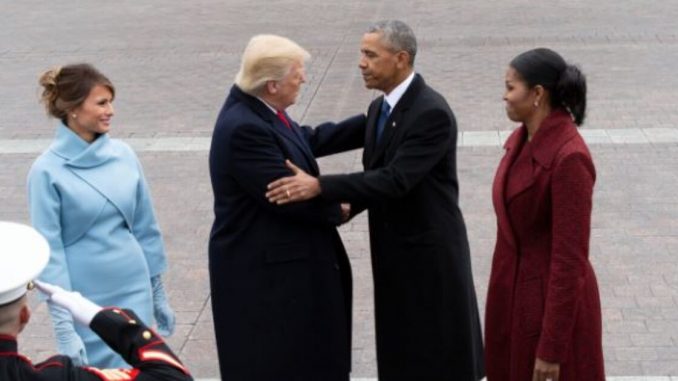
Barack Obama bids President Trump a farewell after his Inauguration. We now know Obama was running a coup against the Trump behind the scenes at the time. – Wikicommons
Published July 19, 2025
In a political firestorm shaking Washington to its core, Director of National Intelligence Tulsi Gabbard has ignited a bipartisan war of words after declassifying explosive intelligence that, according to her, reveals a “treasonous conspiracy” by top Obama-era officials to falsely frame Donald Trump during and after the 2016 election. The revelations, which Gabbard claims show deliberate suppression of evidence clearing Trump of Russian cyber interference, have prompted an immediate and fiery response from GOP leaders—who say the disclosures expose the biggest political scandal in modern American history. As Gabbard hands over the documents to the Justice Department, critics and defenders alike are bracing for a legal and political reckoning that could dwarf even Watergate.
🔥 1. Gabbard accuses Obama administration of a “treasonous conspiracy”
-
On July 18, 2025, DNI Tulsi Gabbard declassified a trove of intelligence—including emails and a December 8, 2016, Presidential Daily Brief—suggesting that Obama officials received clear intel stating that “foreign adversaries did not alter the election via cyber means.” Yet, according to Gabbard, the Obama NSC deliberately suppressed that, then “re-packaged” and leaked a narrative pushing strong Russia-collusion messaging
-
Gabbard labeled it a “years-long coup” and a “treasonous conspiracy,” pledging to hand over all documents to the Department of Justice to pursue prosecutions
2. GOP erupts in support
-
Prominent Republicans including Speaker Mike Johnson, Sens. Tom Cotton, Mike Lee, and Reps. Elise Stefanik, Mike Collins, Greg Steube, and others responded with strong endorsements for Gabbard’s disclosures — describing the alleged plot as a Deep-State betrayal that “makes Watergate look like amateur hour”
-
They called for swift accountability and hailed the declassified intel as vindication of long-held conservative suspicions about politicized intelligence
3. Dems, intel community hit back
-
Critics like Rep. Jim Himes (D‑Conn.) called Gabbard’s claims “baseless” and politically motivated, citing the bipartisan Senate Intelligence Committee report which affirmed Russian interference, though it didn’t establish collusion
-
The report acknowledged hacking and disinformation campaigns targeting the DNC, but stopped short of alleging vote tampering or campaign collusion
-
Many view Gabbard’s move as part of an ongoing political effort to discredit past intelligence—especially in the context of the Trump administration’s broader efforts to re-examine the Russia investigation
 Resulting Effects:
Resulting Effects:
1. Accelerated federal investigations
Gabbard’s criminal referral landed on Attorney General Pam Bondi’s desk Friday night. Although DOJ officials gave reporters a terse “no comment,” senior Republicans say Bondi has already instructed the National Security Division to prepare a preliminary inquiry—an inquiry that, according to Breitbart’s Hill sources, will fold into an ongoing probe of ex‑CIA Director John Brennan and ex‑FBI Director James Comey. If a special counsel is appointed, it would be the first to examine alleged intelligence manipulation rather than election interference itself.
2. Congressional firestorm and looming subpoenas
Speaker Mike Johnson gave Judiciary and Oversight forty‑eight hours to draft subpoena lists; aides say former DNI James Clapper and National Security Adviser Susan Rice top the roster. Sen. Tom Cotton confirmed the Senate Intelligence Committee will hold back‑to‑back open and closed hearings when members return from recess on July 29, with Gabbard slated to testify first. Expect dueling witness lists: Republicans want the “Steele dossier architects,” while Democrats intend to call cybersecurity experts to rebut Gabbard’s cyber‑tampering claims.
3. Intelligence‑community shockwaves
Morale inside NSA and CIA “plummeted overnight,” according to an ODNI‑wide memo obtained by the New York Post. Career analysts fear blanket revocation of clearances or even criminal liability for routine dissenting views logged in 2016–17 cables. One immediate result: NSA Director Tim Haugh ordered a forty‑eight‑hour “pause” on all draft National Intelligence Estimates touching election security until a new chain‑of‑custody review is complete.
4. Election‑year political realignment
With the 2026 midterms only sixteen months away, Republicans are already fundraising off what they’ve branded the “Obama intel hoax”—a label polling firms are testing in tracking surveys this weekend. Democratic strategists worry the story could neutralize their long‑time messaging on “defending democracy” and cyber threats, forcing candidates back onto kitchen‑table economics rather than Russia. Early focus‑group feedback shows independents split: some see overdue transparency; others view Gabbard’s move as pure politics.
5. Media and public‑opinion whiplash
Conservative outlets—from Fox News Digital exclusives to talk‑radio hits—blanketed the story, while legacy networks gave it cautious, process‑heavy coverage. On X, #TreasonousConspiracy trended past one million mentions in twelve hours, but sentiment analysis shows the tag running roughly 55 % negative toward Gabbard, driven by progressive influencers comparing her to “McCarthy with a clearance.” Expect a weekend of wall‑to‑wall cable panels and a fresh round of fact‑checks once DOJ signals whether a special counsel is imminent.
6. Policy ripple effects—declassification momentum
House Oversight’s existing Task Force on the Declassification of Federal Secrets is seizing the moment: Chair Anna Paulina Luna says she’ll fast‑track long‑stalled bills that force automatic release of finished intelligence after ten years unless the president personally signs off on continued secrecy. Civil‑liberties groups and some Democrats are signaling tentative support, arguing that sunlight is the only path to restoring lost public trust.
7. International implications
Moscow promptly released a statement claiming the documents vindicate Russia from “a decade of fabricated smears.” NATO diplomats worry the narrative will undercut future collective responses to genuine cyber incursions: if Washington’s own intel is now viewed as partisan, allied publics may doubt any joint attribution of Russian operations in Europe. Meanwhile, Beijing’s state media is amplifying the story to paint U.S. democracy as “self‑sabotaging.”
 Bottom Line:
Bottom Line:
What began as a long-simmering controversy over the 2016 election has now erupted into what may become a generational reckoning for America’s intelligence institutions and political leadership. Tulsi Gabbard’s decision to declassify documents alleging a “treasonous conspiracy” has sent shockwaves through Washington, reopening old wounds, shattering longstanding narratives, and triggering a wave of legal, political, and diplomatic consequences.
Whether her claims ultimately hold up under legal scrutiny or collapse under partisan pressure remains to be seen—but the lines are already drawn. Supporters say she is exposing the greatest abuse of power in modern American history; critics accuse her of reckless demagoguery and political opportunism. What’s certain is that the fight over the truth behind 2016 is far from over—and its outcome may shape not just the legacy of the Obama and Trump years, but the direction of the country for decades to come.
In an era where faith in institutions is already fragile, the road ahead promises even more turbulence. As both the justice system and public opinion now take center stage, one thing is clear: the cost of political deception—real or perceived—has never been higher.





Be the first to comment